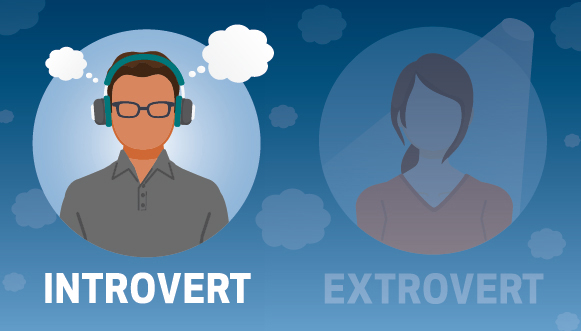Being an Introvert: 5 Things You've Probably Wondered About Yourself, Explained
Jan. 4, 2021 - Katie McCallumAs an introvert, you (probably or may) already know that you prefer to spend more time in your head than you do in conversation with other people. But, by now, you've probably also figured out that there's more to being an introvert than just enjoying your time alone and/or being a good listener.
Whether you're an introvert or you're an extrovert who's desperately trying to understand one, Rhonda Goshine, senior organizational development consultant at Houston Methodist — who's an introvert herself — explores common questions you may have about being introverted.
What does being introverted mean?
Introverts are people who are energized by time spent reflecting on their internal thoughts and feelings.
"Introverts certainly appreciate their alone time, but it's a misconception that all introverts are shy and can't talk to people," says Goshine. "For instance, I can get someone's life story in five minutes. And, similar to extroverts, I enjoy meeting new people since it often means having even more information to process and reflect upon."
Extroverts, on the other hand, are energized by interactions with other people.
"Extended amounts of alone time and lack of social interaction can actually be draining for an extrovert — quite the opposite from us introverts," explains Goshine.
What are an introvert's strengths and weaknesses?
There are pros and cons to everything, personality traits included.
According to Goshine, introverts excel at:
- Being attentive, active listeners
- Reading people and picking up on nonverbal cues
- Thinking critically and thoughtfully
- Portraying authenticity in social interactions
"As introverts, we take time to process what we learn — so active listening and "reading the room" are how we gather the information we need to help process our surroundings," explains Goshine. "In addition, this attentive listening also makes people feel heard, which, in turn, makes them feel appreciated."
And while taking time to process information comes with benefits, it can also come with some drawbacks for those who work in a fast-paced, meeting-heavy environment.
"Prolonged interaction or collaboration at the workplace can be a challenge for introverts since it means having to be constantly available for conversation and quick decision-making. This cuts into the time we need to refresh, refocus and re-energize, as well as to think about and process what we've learned," says Goshine. "This isn't to say that introverts can't collaborate, it's just more of draining process than an energizing one if it consumes most of our day."
In addition, Goshine points out that networking may be more challenging for introverts since it often involves self-promotion, something introverts aren't naturally good at. But, she points out that an introvert can be a good networker — it just may take him or her more time and more practice.
How do extroverts feel about introverts?
Every introvert has at least one relationship — whether it's personal or professional — with an extrovert. And with differing strengths, weaknesses, priorities and tendencies, you may be wondering how your extrovert counterpart sees things from his or her point of view.
Jessica Logan, senior organizational development consultant at Houston Methodist — and Goshine's extroverted coworker — describes what she appreciates about Goshine and other introverts, as well as the tendencies she sometimes struggles with.
"I love the balance that comes with befriending or working with an introvert. In fact, my closest friends and working partners are usually introverts," says Logan. "As an extrovert, I can get pretty ramped up by things, and working with an introvert helps me slow down and process my thoughts. I really value the thoughtfulness introverts bring to the table. In addition, I've learned a lot about how to identify and read subtle, nonverbal cues from my introvert friends and coworkers."
On the flip side, there's a learning curve to interacting with introverts that Logan has had to adjust to.
"Introverts aren't as reactive as extroverts, and I've had to learn that just because an introvert doesn't seem as excited as I am, it doesn't mean he or she is disinterested or disagrees," explains Logan. "Even if it means sitting through what I feel to be an "awkward silence," I've learned that I can't force an introvert to react or communicate immediately. Instead, I give introverts time to process and then make space for them to share their thoughts."
Can an introvert be a good leader?
First thing's first, anyone can be a good leader. In fact, household names like Elon Musk and Bill Gates are exceptional leaders who are also introverts. Here's why:
"Leadership isn't a personality trait, and there are different types of leaders. In general, a good leader is someone who knows how to share his or her expertise, motivate a team and encourage big ideas — all of which are skills that introverts and extroverts alike can learn and excel at," says Goshine. "I think the reason our culture often considers extroverts to be 'more successful' or 'better leaders' is simply because it's what we see. Extroverts are more likely to seek out and be in the spotlight, so it's no surprise that we see plenty of successful extroverts in the news or on our social media feeds."
Great introverted leaders are out there, too, though. We promise.
Can an introvert become an extrovert?
According to both Goshine and Logan, introversion and extroversion are hard-wired personality traits. So, if you're an introvert, rather than trying to change who you are, embrace it!
"What we can do as introverts is learn from our extrovert counterparts, leveraging extrovert behaviors, such as: speaking up, making time to develop meaningful connections and talking through our ideas rather than reflectively processing them in our own minds," suggests Goshine. "And while these behaviors won't help you become an extrovert, they can help improve both your personal and professional life."


